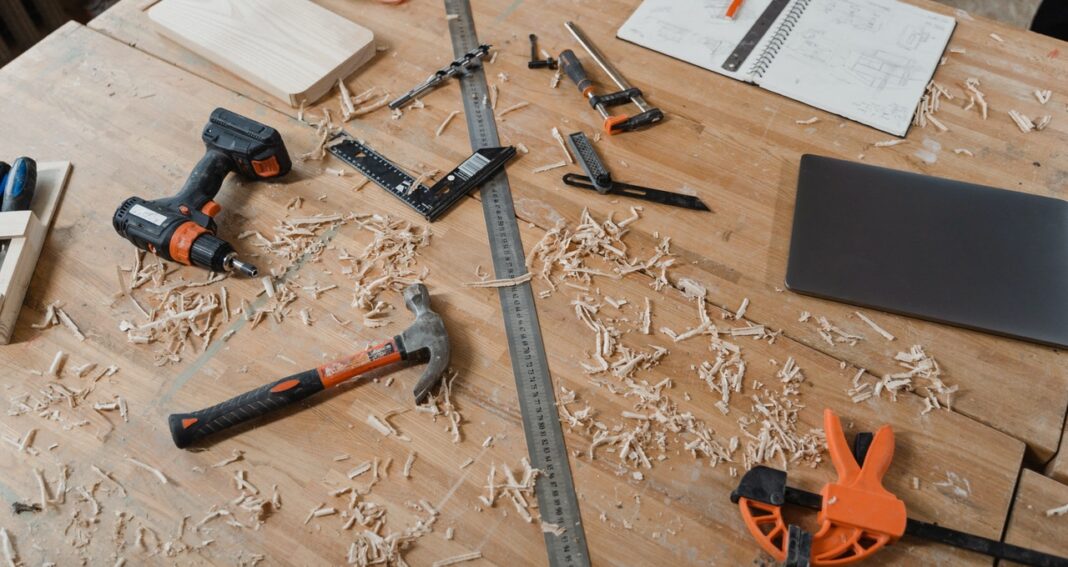Woodworking is a hobby of mine, and I like to read the magazine Fine Woodworking. In the December 2020 issue, Adam Godet, a professional furniture maker, reflects on the process. In his essay “The Tortured Cycle of a Woodworking Project” Godet talks about the psychology of taking a project from initial idea to final product. This resonated with me and by the end of the first paragraph I realized that doing research is like woodworking. Both are creative endeavors intended to achieve a practical purpose, and both involve taking an initial idea and working it into a final product.
Godet talks about how the final product does not come out quite as good as the masterpiece you envisioned at the start. You begin with the excitement of a new idea that you hope will produce perfection, but the reality is that perfection is impossible to achieve. Things happen that produce flaws in the final work. Sometimes it is because the material does not cooperate, and sometimes it is because you make a mistake. When you get to the end it is easy to focus on those flaws and overlook the quality of what you have done.
Doing Research Is Like Woodworking
The phenomenon that Godet describes I have certainly experienced with a woodworking project, but I have also experienced it with research projects. Sometimes I have an idea that I think is going to be great, but in the end does not quite hit the high mark I hoped it would. I am excited to plan the project and to get the elements in place. However, research never quite goes the way you expect. For one thing, compromises are made because the study you really want to do is not feasible. Either there is no opportunity to carry it out, or perhaps it would violate acceptable ethical standards. So, your research design has to consider available resources and feasibility. Then there are problems that arise when conducting the research. If you are using human subjects, they often are not completely cooperative. I do a lot of survey research and sometimes subjects do not pay attention, and sometimes might even respond randomly to questions. There are many potential factors that can bias and distort people’s responses which can affect the results. Sometimes you even make mistakes. For example, you discover a consequential typo after data collection is completed. Finally, the results might not be what you expect. If you have hypotheses, they might not be supported. Perhaps patterns of relationships do not suggest a coherent story. Sometimes what you hoped would achieve statistical significance does not.
Writing the paper to describe the research you completed can be a similar journey. You begin eager to get your results into a written form, but there are struggles along the way. Sometimes the final product is not quite as good as you hoped when you started the project. Even if you are satisfied with the paper, peer reviewers will not share that opinion. It is easy to get discouraged when others do not mirror your enthusiasm for what you have done.
Maintaining Realistic Expectations
It is easy to get excited early on about a project. There can be a honeymoon period with every new idea. Live with the idea for a while, and sometimes a more sober reality sets in. The more you work on a project, the more you gain perspective and see the flaws. The important thing is not to get discouraged while you are conducting the research, writing the paper, or dealing with reviewer comments. No research work is ever perfect; each one has strengths and weaknesses. Every study is but one tiny piece of a larger puzzle, and the combined results of many studies will offer insights about a phenomenon. Finally, as Godet notes, if you set the project aside for a while and come back to it, you will have a different point of view and it is amazing how much better the project looks after a good night’s sleep.
Godet traces the psychology of a project from stages of excitement, disillusionment, and acceptance. He ends on an optimistic note of looking to future successful projects, which I can relate to as well. In any activity, including conducting research, the important thing is not achieving perfection, but striving for it.

Interesting comparison. Woodworking is mainly dependant on your hands and requires a quiet mind delivering a vision from the invisible (if you are designing something you envisioned)., and research depends on intelligence and special abilities coming from the mind. So, I guess a great mind-body connection can significantly enhance the journey and the outcome of both type of projects.
Striving for perfection is a weakness we fall for in many areas of our lives. Including personal relationships. Learning to detach from outcome, embracing the present moment, playfulness and knowing that you are doing the best you can is a great remedy for the “unfulfilled feeling”, and a cure for disillusioned 🙂
TX. Work on a powerful mind-body-spirit connection.
Always a pleasure to read you,
Ana Paula
Thank you Ana Paula.
Great to hear from a former student.
Paul
Thank you for sharing your wisdom🌻